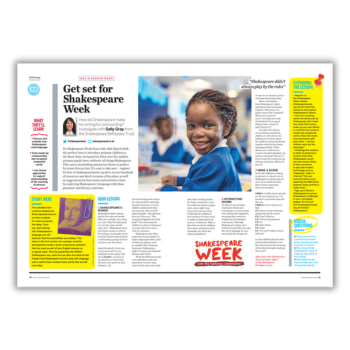Use this Shakespeare English lesson from Sally Gray at the Shakespeare Birthplace Trust to cover the concepts of compound words and idioms…
Shakespeare English lesson learning objectives
- Discuss and evaluate how Shakespeare used language
- Form nouns by compounding and recognise compound words
- Use drama approaches to support understanding of the meaning of idoms
First activity
Shakespeare didn’t always play by the rules and would often, for example, use a noun as a verb. Take the body parts: ear, eye, lip, nose, mouth, knee, foot – Shakespeare used all of these nouns as verbs in his writing.
An example can be found in Hamlet when Hamlet is instructing a group of actors on how to say their lines:
Speak the speech, I pray you, as I pronounced it to you, trippingly on the tongue. But if you mouth it, as many of our players do, I had as leif the town crier spoke my lines. (Hamlet, 3.2)
List some body parts such as eye, leg and elbow and make up some sentences. Can the children understand what you mean by, ‘She eyed the apple hungrily’; ‘She elbowed him out of the way’; ‘The young boy legged it out of the park?’
Now encourage the children to choose a body part (a noun) and turn it into a verb in a sentence.
Shakespeare also often joined two words together to make compound words, some of which we still use such as ‘eyeball’ (The Tempest), ‘bedroom’ (Midsummer Night’s Dream) and ‘ladybird’ (Romeo and Juliet).
Write the two halves of compound words on different cards. Challenge children to find a partner for their word to make a compound word such as ‘toothbrush’.
Make a list of the words the children have made and discuss their meanings. Are there any other possibilities?
Sally Gray is the Shakespeare Week education officer at The Shakespeare Birthplace Trust. Browse more Shakespeare Week resources.

Similar resources
- No Refuge – Graphic novel activities about refugees for UKS2
- Short story writing – Author-led resources for KS1 and KS2
- Christmas activity sheets – KS1 / KS2 fun & educational printables
- Learning gaps – How to ensure no pupil drifts too far
- Writing horror – Write a scary scene with Fear Files: Hide & Seek










